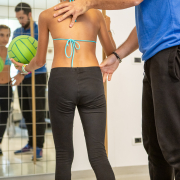Development and validation of AI-based automatic measurement of coronal Cobb angles in degenerative scoliosis using sagittal lumbar MRI
Jasper W van der Graaf, Miranda L van Hooff, Bram van Ginneken, Merel Huisman, Matthieu Rutten, Dominique Lamers, Nikolas Lessmann, Marinus de Kleuver
Eur Radiol 2024 Feb 21.doi: 10.1007/s00330-024-10616-8
Abstract
Objectives: Severity of degenerative scoliosis (DS) is assessed by measuring the Cobb angle on anteroposterior radiographs. However, MRI images are often available to study the degenerative spine. This retrospective study aims to develop and evaluate the reliability of a novel automatic method that measures coronal Cobb angles on lumbar MRI in DS patients.
Materials and methods: Vertebrae and intervertebral discs were automatically segmented using a 3D AI algorithm, trained on 447 lumbar MRI series. The segmentations were used to calculate all possible angles between the vertebral endplates, with the largest being the Cobb angle. The results were validated with 50 high-resolution sagittal lumbar MRI scans of DS patients, in which three experienced readers measured the Cobb angle. Reliability was determined using the intraclass correlation coefficient (ICC).
Results: The ICCs between the readers ranged from 0.90 (95% CI 0.83-0.94) to 0.93 (95% CI 0.88-0.96). The ICC between the maximum angle found by the algorithm and the average manually measured Cobb angles was 0.83 (95% CI 0.71-0.90). In 9 out of the 50 cases (18%), all readers agreed on both vertebral levels for Cobb angle measurement. When using the algorithm to extract the angles at the vertebral levels chosen by the readers, the ICCs ranged from 0.92 (95% CI 0.87-0.96) to 0.97 (95% CI 0.94-0.98).
Conclusion: The Cobb angle can be accurately measured on MRI using the newly developed algorithm in patients with DS. The readers failed to consistently choose the same vertebral level for Cobb angle measurement, whereas the automatic approach ensures the maximum angle is consistently measured.
Clinical relevance statement: Our AI-based algorithm offers reliable Cobb angle measurement on routine MRI for degenerative scoliosis patients, potentially reducing the reliance on conventional radiographs, ensuring consistent assessments, and therefore improving patient care.
Key points: • While often available, MRI images are rarely utilized to determine the severity of degenerative scoliosis. • The presented MRI Cobb angle algorithm is more reliable than humans in patients with degenerative scoliosis. • Radiographic imaging for Cobb angle measurements is mitigated when lumbar MRI images are available.
Keywords: Cobb angle; Deep learning; Magnetic resonance imaging; Scoliosis; Spine.




Leave a Reply
Want to join the discussion?Feel free to contribute!